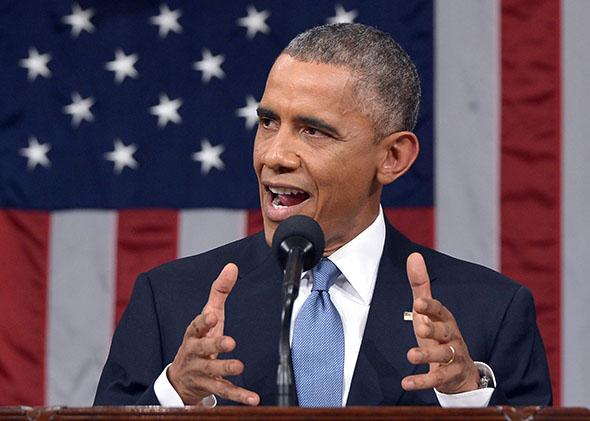As his sixth State of the Union came to a close, President Obama said, “I have no more campaigns to run.” Some Republicans in the audience applauded that line. It wasn’t intended as an applause line, and the president couldn’t let it go unanswered. “I know, because I won both of them.” He did not go on to refer to his rock-hard abs, but given the president’s confident, forward-leaning posture, it seemed like he might. On Tuesday night a president who half a year ago seemed exhausted with the office seemed to be enjoying himself as he declared that the verdict was in: His policies had helped turn around the economy. His good cheer showed in ways big and small, including that for the first time in a State of the Union he has given, he used the familiar line “the state of the union is strong” high up in the speech.
The State of the Union offers a microcosm of the challenge for the entire Obama presidency. The form of the speech is full of constraints and compulsory items, much like the office itself. Tuesday night was Obama’s best effort yet at breaking out of the binds of the speech, and it echoed the escape he seems to be making from the lame-duck label as well. It was not a new Obama but a man who seemed to have figured out how to be more himself in the moment. It won’t win him any support from Republicans, but if he is trying to win a conversation, it was a strong opening gambit.
The president has offered policies to help the middle class in the past, but he lacked standing because the economic recovery was not underway. Now, if people buy his argument that the economy is improving—and that the progress is durable—they may be more open to his ideas. Republicans now are in a different position, too. They can’t get as much political mileage out of just saying no. They have to come up with policies that will be popular and can pass both houses of Congress. That’s difficult, and because they are now in control, they are more on the hook for providing alternatives.
What helped Obama rhetorically was that he’d outlined his proposals in the previous two weeks. He didn’t have to cram everything in the speech again, which allowed him to tell a story. But he wrapped his message in the narrative of the American people, returning to the storytelling style that was a part of his 2008 campaign. At the center of the speech was the Erler family of Minnesota who had struggled but come back during the economic downturn. Their story was America’s story, said the president.
The president pitched a series of policies aimed at the Erler family and all American families like it. The Erler Plan consisted of relief for their daily struggles—help with child care, relief for two-earner households, and paid sick leave. Those policies are popular, but they are also an appeal to show that he understands what people are going through. They are an opening statement in a debate in which he and his fellow Democrats are claiming to be on the side of regular people. He was also trying to put Republicans in a box by forcing them to answer the question Who are you for?
It was a very partisan speech, even though the president said he was going to offer policies that were “practical, not partisan.” Though Obama referenced his 2004 speech in Boston where he spoke of a unified America that was better than its partisan divisions, he said plenty to keep the GOP roiling. He painted Republicans as protectors of lobbyists and the super-wealthy. He issued a host of veto threats. He tweaked them as limited in vision—“let’s set our sights higher than a single oil pipeline”—and said they were hypocrites on the minimum wage.
Republicans were not amused. “It was long. Defiant. Untethered from reality,” said a House leadership aide. The reality Republicans recognize is the one that Sen. Joni Ernst mentioned near the top of her Republican response. “We heard the message you sent in November—loud and clear. And now we’re getting to work to change the direction Washington has been taking our country.”
The president has won two elections. Ernst and her colleagues won the last one. The winner of the debate that kicked off Tuesday night may go a long way to determining which side wins the next one.
